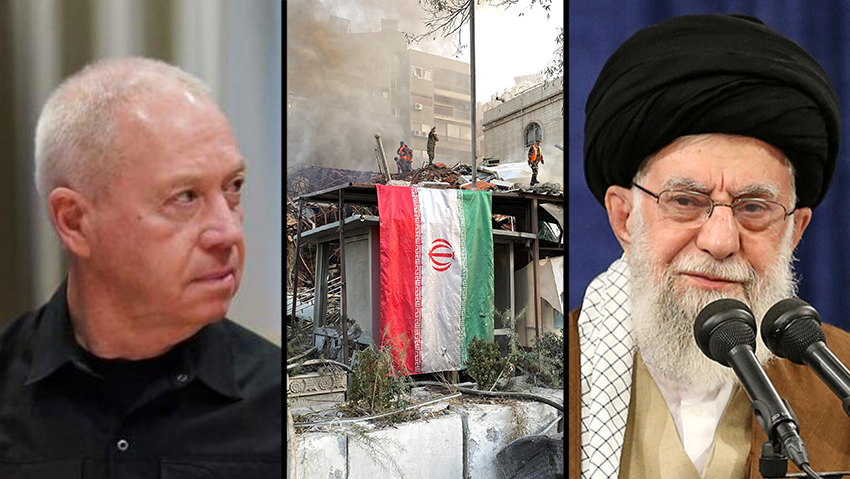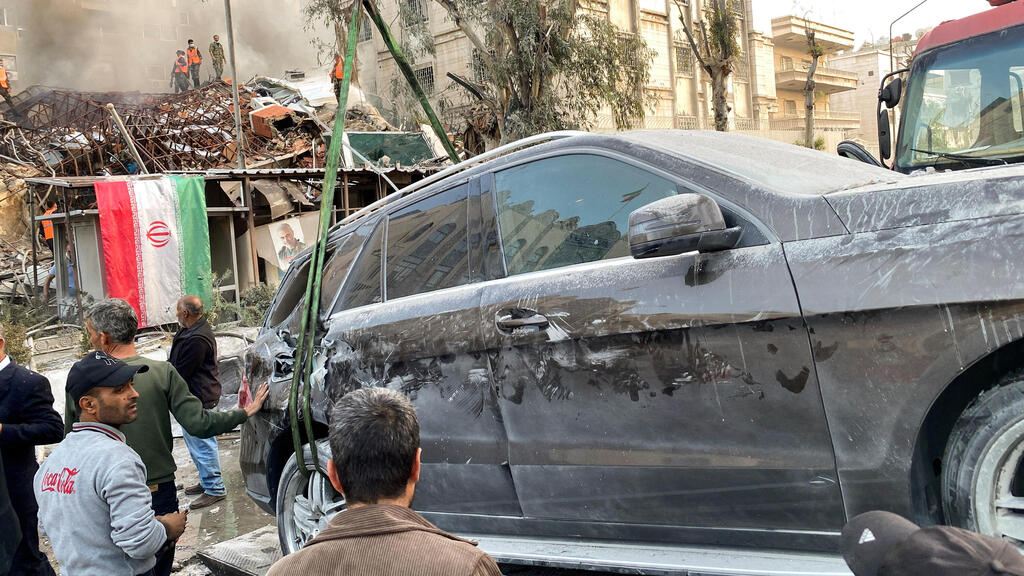Getting your Trinity Audio player ready...
Less than a day after an air strike near the Iranian embassy in Damascus killed Islamic Revolutionary Guard Corps (IRGC) commander Mohammad Reza Zahedi, Israel's Defense Minister Yoav Gallant said that Israel is working “to make it clear to everyone who acts against us, all over the Middle East, that the price for acting against Israel will be a heavy price.”
Damage from attack near Iranian embassy in Damascus
Meanwhile, Iran's Supreme Leader Ali Khamenei vowed revenge and said that the "Zionist regime will be punished by the hands of our brave men. We will make it regret this crime and others it has committed."
According to foreign reports, around 5 p.m. on Monday, six missiles were launched from F-35 aircraft toward a building near the Iranian embassy in Syria. Senior Quds Force commander Mohammad Reza Zahedi was eliminated, along with six other members of the Revolutionary Guards including his deputy. Zahedi was a senior officer in the Revolutionary Guards, who served as Iran's emissary to command the Quds Force in Lebanon and Syria. In his various positions, he served as the head of the operations department, the commander of the ground forces and the commander of the air forces in the Revolutionary Guards.
2 View gallery


Israel's Defense Minister Yoav Gallant praises, Iran's Supreme Leader Ali Khamenei condemns attack near Iran's embassy in Damascus
(Photos: EPA / SUPREME LEADER OFFICE HANDOUT, רויטרס / Firas Makdesi, אריאל חרמוני, משרד הביטחון)
Gallant, who in fact hinted that Israel was behind the bold and unusual assassination, said in a discussion with the members of the Foreign Affairs and Security Committee in his office at the Kirya base in Tel Aviv: "We are in a multi-arena war, in attack and defense. We receive evidence of this every day, including the last few days, We operate everywhere, every day to prevent the strengthening of our enemies and to make it clear to everyone who acts against us, all over the Middle East, that the price for acting against Israel will be a heavy price."
Israel has not taken official responsibility for the assassination. Israeli officials informed the U.S. that the strike would take place just a few minutes before the assassination. The New York Times on Monday night quoted four Israeli officials as saying that the IDF was behind the operation. According to the report, the target was a "secret meeting" of senior Iranian intelligence officials from the Quds Force, alongside senior officials of the Palestinian Islamic Jihad. Jihad itself has not yet announced any casualties in the attack.
Iran does not believe the U.S. claims that Washington had no prior knowledge of the attack, and that it only learned of the airstrike with the Israeli war planes were already in the air on the way to their destination.
Ali Simkhani, Khamenei's advisor who also previously served as head of Iran's National Security Council, said that "Israel made a serious mistake and must pay a heavy price for what she did." He added that: Washington "remains directly responsible whether or not it was aware of the intention to carry out this attack."
Iran initially claimed that the attack was aimed at the consulate building, and diplomats were also killed in it, a claim made in an attempt to portray Israel as violating international law. Israeli officials have strongly rejected this claim and said that the Iranian consulate in Syria is actually in Latakia. The building that was attacked actually served as a real military headquarters used by the Quds Force, even if it supposedly belonged to the embassy and enjoyed its protection. Israeli officials clarified to the New York Times that for these reasons it is a legitimate military target that does not enjoy the protection reserved for the consulate.
Iranians burn US and Israeli flags in Palestine Square in Tehran, Iran
Zahedi himself was a military man, the commander of the Quds Force in Syria and Lebanon who in some ways influences Israel much more than the commander of the entire force, Ismail Qaani. Among other things, he concentrated under him everything that had to do with the targeting of military personnel and weapons, and also directed terrorist operations inside Israel. Protesters gathered in Palestine Square in Tehran on Monday night, and burned the flags of Israel and the U.S. in protest against the assassination.
Meanwhile, the Kremlin said on Tuesday that the suspected Israeli air strike against the Iranian consulate in Damascus was an "act of aggression."
Kremlin spokesman Dmitry Peskov said such attacks violated all the foundations of international law.





